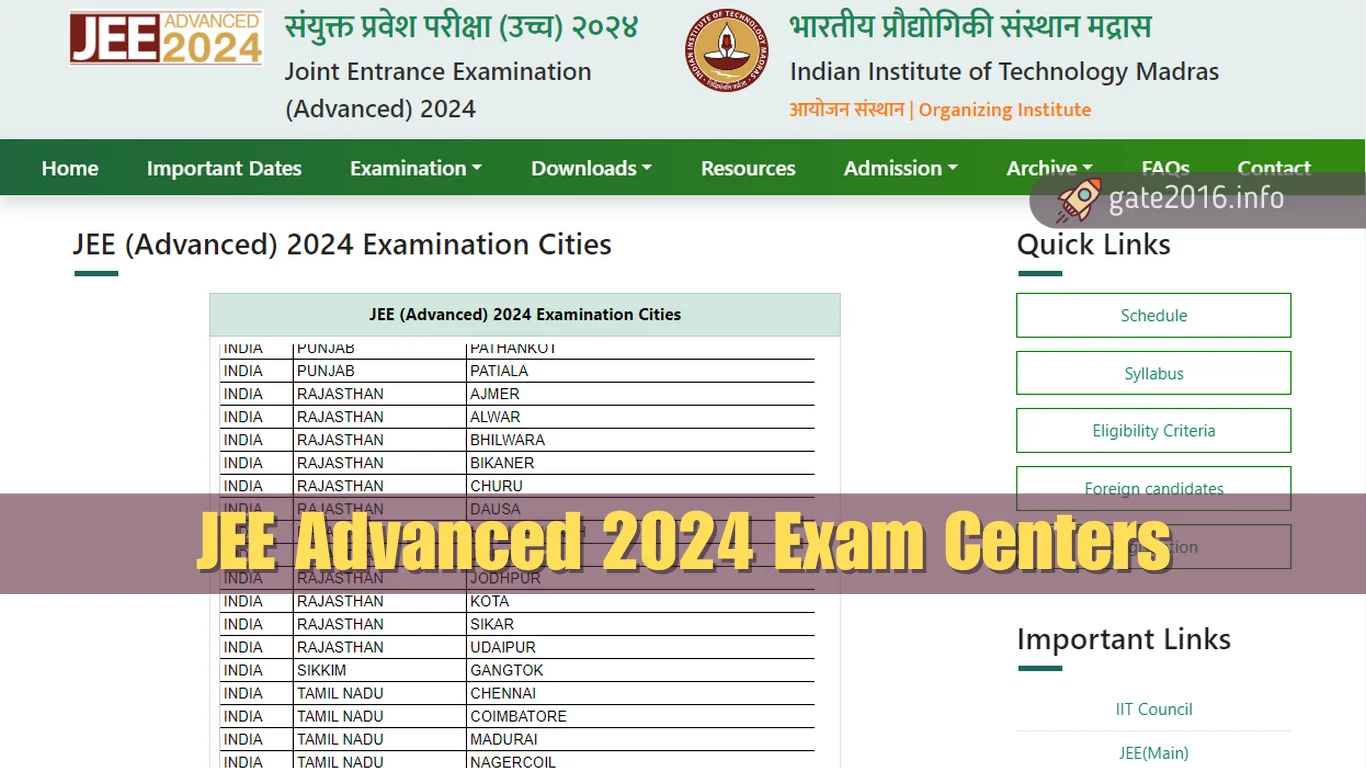Advertisements
Ratings

GATE 2025: What Prepare, What Not in Last 1 Month? – As the Graduate Aptitude Test in Engineering (GATE) 2025 approaches, the final month of preparation is crucial. Students often wonder what areas to focus on and what to potentially skip.
This detailed guide provides insights into efficient strategies for the last four weeks before the exam, ensuring you cover the most important topics and refine your test-taking skills.
Contents
- 1. Understanding the Importance of the Last Month Before GATE 2025
- 2. What to Focus On in the Last Month
- 3. What to Avoid in the Last Month
- 4. Effective Revision Techniques
- 5. Last-Minute Tips and Strategies
- 5. Last-Month Preparation Techniques: Real Time Examples
- Conclusion
- GATE 2025: What Prepare, What Not in Last 1 Month? Top 5 FAQs
1. Understanding the Importance of the Last Month Before GATE 2025
The last month before GATE 2025 is not just about learning new topics but reinforcing your grasp on key concepts and improving your accuracy and speed. Here’s how to prioritize your studies during this critical period:
| Focus Area | Activity Description |
|---|---|
| Revision | Concentrate on revising subjects you are strong in. |
| Mock Tests | Take frequent full-length timed tests. |
| Weak Areas | Identify and strengthen your weak subjects. |
| Formulae | Review and memorize essential formulas and shortcuts. |
| Relaxation | Incorporate short breaks and relaxation techniques into your routine to maintain peak mental condition. |
Strategic Importance: This period is critical for transitioning from the learning phase to the application phase, where you apply your knowledge to solve problems efficiently. It’s about fine-tuning your strategy and approaching the exam with confidence.
2. What to Focus On in the Last Month
During the final month, your focus should shift towards consolidation of knowledge and improving examination temperament through the following strategies:
| Strategy | Benefits |
|---|---|
| Comprehensive Revision | Ensures a strong grasp of all key topics and concepts. |
| Time Management Practice | Improves your ability to manage the limited time during the exam effectively. |
| Prioritizing High Yield Topics | Focuses your efforts on topics that are most likely to appear in the exam. |
| Simulation of Exam Conditions | Helps adapt to the exam’s pressure and timing. |
Detailed Approach: Allocate specific days to different subjects based on their weightage and your proficiency. For instance, dedicate more time to subjects like Engineering Mathematics and Core Technical Subjects which are often high-yielding.
3. What to Avoid in the Last Month
Avoiding certain traps in the last month can be as crucial as focusing on the right topics:
| Mistake | Impact |
|---|---|
| Cramming New Topics | Can lead to confusion and dilute already acquired knowledge. |
| Neglecting Health | Poor health can lead to inefficiency in study and poor exam performance. |
| Overemphasis on Weak Areas | Spending too much time on weak areas at the expense of revising strong areas can undermine overall preparation. |
Preventive Measures: Balance your study schedule to include breaks and ensure you are not neglecting your well-being. Sleep and nutrition are vital during this period.
4. Effective Revision Techniques
Revision techniques that can significantly enhance your recall and application skills in the exam include:
| Technique | Description |
|---|---|
| Active Recall | Test yourself frequently to enhance memory retention. |
| Spaced Repetition | Use spaced repetition to review notes and key points. |
| Mind Mapping | Create visual connections between topics for better understanding and recall. |
| Peer Discussions | Discuss tricky concepts with peers to get new insights and reinforce learning. |
Application: Set daily targets for revision and use varied techniques to keep the revision process dynamic and effective.
5. Last-Minute Tips and Strategies
In the last few days leading up to the exam, consider the following last-minute strategies to boost your confidence and readiness:
| Strategy | Effectiveness |
|---|---|
| Relaxation Techniques | Use techniques such as meditation and deep breathing to manage pre-exam stress. |
| Quick Reviews | Go over summary notes and formula sheets rather than in-depth materials. |
| Equipment Check | Ensure you have all necessary items prepared for the exam day, like admit card, ID proof, and required stationery. |
| Strategy Finalization | Finalize your time management and question approach strategies based on mock test performances. |
5. Last-Month Preparation Techniques: Real Time Examples
Focus on High-Value Topics
Understanding High-Value Topics
In the last month before GATE 2025, prioritize topics that carry more weight and have historically been important in the exam. Focusing on these areas can yield higher returns on your invested study time.
Real-Time Example:
A GATE aspirant in 2023 focused her last month on Control Systems and Digital Circuits, which are significant sections for the Electronics and Communication paper. She revised key formulas and problem-solving techniques, which played a crucial role in her scoring above 70 marks in the exam.
Topics to Prioritize:
- Control Systems
- Machine Design
- Thermodynamics
- Digital Circuits
- Network Theory
Table: Importance of Selected Topics in GATE
| Topic | Estimated Weightage | Previous Year Questions |
|---|---|---|
| Control Systems | High | Frequently asked |
| Thermodynamics | High | Often complex problems |
| Network Theory | Moderate to High | Regularly featured |
Refining Problem-Solving Skills
Importance of Practice
The last month should also be about honing your ability to solve problems efficiently and accurately. Focus on applying concepts in various problem settings to enhance flexibility and speed.
Real-Time Example:
An engineering student set up a routine to solve at least 10 new problems from previous year papers every day during the final month. This practice helped him identify common pitfalls and improve his accuracy, significantly enhancing his performance in the actual exam.
Effective Techniques:
- Timed practice sessions
- Peer discussions
- Online mock tests
Table: Problem-Solving Session Layout
| Activity | Duration | Focus |
|---|---|---|
| Timed Practice | 2 hours | Solving new problems |
| Review | 1 hour | Analyzing errors |
| Peer Discussion | 1 hour | Clarifying doubts |
Revision Strategies
Streamlining Revision
With limited time, your revision should be strategic and structured to cover substantial content effectively.
Real-Time Example:
A candidate created summary sheets for each major subject, which included formulas, key points, and common mistakes. During the last week, these sheets were invaluable for quick reviews and keeping important information fresh.
Effective Revision Techniques:
- Mind maps for complex theories
- Flashcards of formulas
- Group study for broader insights
Table: Revision Techniques and Their Benefits
| Technique | Benefit |
|---|---|
| Mind Maps | Visual summary of concepts |
| Flashcards | Quick recall of information |
| Group Study | Diverse understanding |
Avoiding New Topics
Risks of Overloading
Starting new topics in the last month can be risky and may divert your attention from revising core material effectively.
Real-Time Example:
In 2024, a student decided to pick up a new subject three weeks before the exam, resulting in confusion and insufficient practice time for previously well-understood topics. This strategy negatively impacted his overall readiness.
Advice:
- Focus on strengthening existing knowledge
- Utilize time for revising and practicing familiar subjects
Table: Risk Assessment of New Topics
| Decision | Potential Outcome |
|---|---|
| Starting New Topics | Might lead to incomplete preparation |
| Focusing on Known Topics | Enhances depth of understanding |
Stress Management and Well-being
Maintaining Balance
The psychological aspect of preparation is just as important as the academic side. Managing stress and ensuring mental health can significantly influence your performance.
Real-Time Example:
A 2023 candidate scheduled regular physical activities and meditation into her study plan, which helped maintain her concentration and reduce exam anxiety effectively.
Strategies for Stress Management:
- Regular breaks
- Physical exercise
- Meditation and mindfulness
Table: Daily Schedule for Well-being
| Time Slot | Activity |
|---|---|
| Morning | Light exercise |
| Afternoon | Short naps after lunch |
| Evening | Relaxation techniques |
Conclusion
The final month before GATE 2025 can determine the level of your performance. Focus on refining your strengths, optimizing your weaknesses, and entering the examination hall with a calm, prepared mind. Stick to a structured revision plan, keep testing yourself, and maintain a healthy balance between study and relaxation for the best outcomes on the exam day.
GATE 2025: What Prepare, What Not in Last 1 Month? Top 5 FAQs
FAQ 1: What should I focus on in the last month before GATE 2025?
Answer:
In the last month, prioritize revising high-yield topics and subjects where you feel less confident. Focus on consolidating your knowledge in core areas rather than trying to learn new topics. Practice through past papers and mock tests to enhance your time management and problem-solving skills under timed conditions.
FAQ 2: Is it advisable to start new topics in the last month of preparation?
Answer:
It is generally not recommended to start new topics in the last month. This period should be used to strengthen your understanding of the subjects you have already covered. Starting new topics can lead to confusion and may not leave you enough time to adequately grasp and practice them, potentially impacting your overall performance negatively.
FAQ 3: How many hours per day should I study in the last month before the GATE exam?
Answer:
The number of study hours can vary from person to person, but it is crucial to maintain a balanced schedule. A recommended approach is to study for 6-8 hours a day, ensuring you take regular breaks to avoid burnout. Adjust this based on your stamina and the topics you need to cover, but remember, quality of study often outweighs quantity.
FAQ 4: Should I join a test series in the last month if I haven’t joined one yet?
Answer:
Joining a test series in the last month can be beneficial as it helps simulate real exam conditions and provides a platform to assess your preparation. It also aids in practicing time management and identifying any weak areas that need further revision. If possible, choose a test series that provides detailed explanations and feedback.
FAQ 5: What are some effective stress management techniques for the last month before the GATE exam?
Answer:
Effective stress management is crucial in the final month. Techniques include:
- Scheduled Breaks: Incorporate short, frequent breaks into your study plan to help your brain rest and retain information better.
- Physical Activity: Engage in light exercise or yoga to keep your body active and mind fresh.
- Mindfulness and Meditation: These practices can help maintain mental focus and reduce anxiety.
- Balanced Diet and Adequate Sleep: Ensure you eat healthily and get sufficient sleep to optimize brain function and energy levels.
Related Posts
- GATE 2025: Myths, Facts & Their Solutions
- Coaching or Self-Study for GATE 2025: Which One Should You Choose?
- AAI Through GATE 2024 – JE (Junior Executive)
- M Tech and MS Programs Through GATE and GRE: Navigating Postgraduate Options
Related Tags
Gate 2025 what prepare what not in last 1 month science, Gate 2025 what prepare what not in last 1 month quora, Gate 2025 what prepare what not in last 1 month pdf, Gate 2025 what prepare what not in last 1 month cse, gate 2025 preparation strategy, gate 2025 syllabus, gate 2025 official website, gate 2025 exam date



